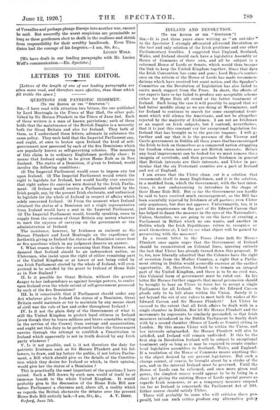LETTERS TO THE EDITOR.
[Letters of the length of one of our leading paragraphs are often more read, and therefore more effective, than those which fill treble the space.] QUESTIONS FOR PATRIOTIC IRISHMEN.
[TO THE EDITOR OF THE " SPECTATOR."1
Sxn,—I have read with attention two letters, the one published by Lord Monteagle in the Times of May 22nd, the other pub- lished by Sir Horace Plunkett in the Times of June 2nd. Each of these writers is a man of known patriotism; each of them holds that the maintenance of the British Empire is a necessity both for Great Britain and also for Ireland. They both of them, as I understand these letters, advocate in substance the same policy. They each hold that the Imperial Parliament can, and ought, at once to bestow upon Ireland the kind of self- government now possessed by each of the five Dominions which are popularly known as self-governing colonies. The meaning of this claim is to ordinary Englishmen perfectly clear : It means that Ireland ought to be given Home Rule as in New Zealand. The status of a Dominion, if given to Ireland, would involve the following conditions:
(1) The Imperial Parliament would cease to impose any tax upon Ireland. (2) The Imperial Parliament would retain the right to legislate for Ireland, but would hardly ever exercise that right unless its exercise were desired by the Irish Parlia- ment. (3) Ireland would receive a Parliament elected by the Irish people, say, by the present Irish electorate, and authorised to legislate for the whole of Ireland in respect of affairs which solely concerned Ireland. (4) From the moment when Ireland obtained the status of a Dominion not a single representative from Ireland would have a seat in the Imperial Parliament. (5) The Imperial Parliament would, broadly speaking, cease to supply from the revenue of Great Britain any money whatever to meet the expense of carrying on the government or the administration of Ireland.
The insistence, however, by Irishmen so eminent as Sir Horace Plunkett and Lord Monteagle on the expediency of forthwith giving to Ireland the status of a Dominion raises four or five questions which in my judgment deserve an answer.
I. What reason is there for assuming that Sinn Feiners, who demand that Ireland should be an independent nation, or Ulstermen, who insist upon the right of either remaining part of the United Kingdom or at lowest of not being ruled by one Irish Parliament elected by the whole Or Ireland, will even pretend to be satisfied by the grant to Ireland of Home Rule as in New Zealand ?
II. Is it possible for Great Britain, without the gravest danger to her independence as against foreign powers, to confer upon Ireland even the whole extent of self-government possessed by each of the five Dominions?
III. Is it conceivable that if Parliament should under any Act whatever give to Ireland the status of a Dominion, Great Britain could maintain or try to maintain by any means short of civil war the rule of law and order throughout Ireland ?
IV. Is it not the plain duty of the Government of what is still the United Kingdom to protect loyal citizens in Ireland [even though they be brave soldiers and brave constables acting in the service of the Crown) from outrage and assassination, and ought not this duty to be performed before the Government carries through the attempt to establish a Constitution in Ireland which apparently is not in truth desired by any Irish party whatever ?
V. Is it not possible, and is it not therefore the duty for patriotic Irishmen euoh as Sir Horace Plunkett and his fol- lowers, to draw, and lay before the public, if not before Parlia- ment, a Bill which should give us the details of the Constitu- tion which they desire for Ireland or which, in their opinion, would give her the status of a Dominion ?
This is practically the most important of the questions I have raised. Such a Bill drawn by such men would of itself be of immense benefit to the whole United Kingdom. It would probably give to the discussion of the Home Rule Bill now before Parliament a clearness and, above all, a reality which as regards the British electorate the debates over the present






































 Previous page
Previous page